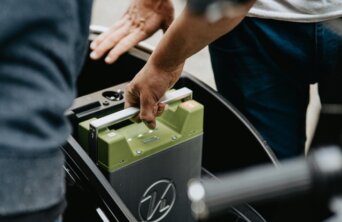- About
- Topics
- Picks
- Audio
- Story
- In-Depth
- Opinion
- News
- Donate
-
Signup for our newsletterOur Editors' Best Picks.Send
Read, Debate: Engage.
| topic: | Climate action |
|---|---|
| located: | India |
| editor: | Bindu Gopal Rao |
While e-waste is a challenge with electric vehicles, there is a transformative opportunity to harness the power of green innovation to recycle e-waste and extract critical minerals, turning what was once considered a threat into a valuable resource.
India relies entirely on lithium, nickel and cobalt imports, and copper imports are as high as 93%. These four minerals are most critical to achieving the set target. Still, lithium, a non-ferrous alkali mineral, has been in demand for the lithium-ion batteries needed to run electric vehicles, making it vital to India's EV transition.
The world's current mining operations cannot extract the lithium required to meet the skyrocketing demand for these batteries. Hence, recycling existing batteries is crucial for shifting the global energy system sustainably. Besides mining, India can extract lithium from EV batteries.
Lithium-ion battery recycling presents significant environmental benefits compared to mining. Recycling reduces the need for new raw material extraction, curbing environmental degradation caused by mining activities.
"Reusing materials from end-of-life batteries mitigates energy consumption and greenhouse gas emissions associated with mining and refining. Additionally, recycling mitigates the environmental impact of hazardous waste generated by improper disposal of batteries," says Nitin Gupta, CEO and Co-founder of Attero Recycling.
More than $4 billion has been invested in lithium battery recycling globally. From a technology standpoint, worldwide, even after a $4 billion investment, all the companies are at a maximum 75% recovery efficiency.
Embracing battery recycling in India contributes to a triple impact—economic growth, ethical responsibility, and a green future. Recycling establishes a robust industry, creating jobs and fostering economic growth. Ethically, it addresses environmental concerns, as improper battery disposal poses risks.
By recycling, India reduces reliance on raw material imports, enhancing resource security. This green initiative aligns with global sustainability goals, minimising the carbon footprint of new battery production and promoting responsible consumption.
"As the world's premier lithium-ion battery recycling entity with 45+ global patents, we take pride in our role as pioneers in scientific recycling. Our NASA-approved technology makes us the best in the domain. In the lithium-ion battery space, our advanced recycling plant boasts an efficiency of over 98%, surpassing the industry average of 60%. We are actively involved in collecting electronic waste directly from consumers, addressing the challenges faced by the informal sector," says Gupta. Recycling these batteries is a trash-to-treasure opportunity that can be tapped further.
Image by Kumpan Electric.

